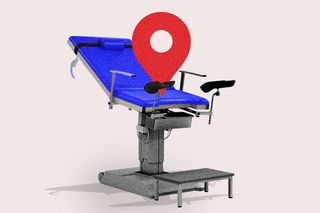
Google Will Delete People’s Data on Abortion Clinic Visits. Instead of Praising the Company, Should We Rethink Privacy?
Google’s decision served as a reminder of how oblivious many of us are to the degree of monitoring we’re being subjected to at every moment.

Last week, Google announced that it will delete users’ location data following visits to abortion clinics — lest the data trail should be used to convict U.S. citizens of illegally terminating their pregnancies. With Roe v. Wade — a landmark American judgment guaranteeing women’s reproductive right to abortion — being overturned recently, Google’s decision allowed many to breathe a sigh of relief amid the despair unleashed onto them by the U.S. Supreme Court. To put people at greater ease, Google even went to promise that it will not store users’ location histories from their visits to fertility centers, addiction treatment facilities, and weight loss clinics either.
Praiseworthy, right? Or, is it? To put this into perspective: Google is effectively giving people back their privacy. How we view this decision, and of several other companies who may benevolently come forward to support reproductive justice, is imperative. Instead of exalting this move, we must look deeper within to understand just how normalized surveillance has become to us and, worse still, how little we acknowledge it and recognize the problem.
The surveillance culture is one unfolding all the time, everywhere, all at once. For many smartphone users like me, Google’s decision simply served as a reminder of how oblivious we are to the scrutiny of our lives — including our communications, our whereabouts, and our very ideologies, among others — at any given moment. Technology has gradually slid into the role of the pesky neighbor peeping from their window, binoculars in hand, keeping an eye out for salacious gossip. And we have accepted it as the new normal.
Rather hypocritically, then, we judged Maheep Kapoor for admitting on Fabulous Lives of Bollywood Wives, “I am not a stalker, but it is my guilty pleasure to check up on my Juhu neighborhood. The other day, I knew about [a] fight that was happening [at a neighbor’s house] and I usually know what my neighbor is cooking. I just have to check out the Juhu neighborhood.” This is not to see that our criticism of Kapoor is uncalled for. Wouldn’t it have been absurd, though, if she decided to stop prying on her neighbors and people lauded her for it? That absurdity is precisely what ensues when we celebrate Google’s decision.
Related on The Swaddle:
What if someone wants the “favor” of expungement that Google is so “kindly” bestowing upon its users to also be extended to their visits to amusement parks, or to the neighborhood grocery store? One’s natural reaction to that, after being conditioned into perceiving surveillance as the norm, is often to ask: “What do they care if people find out about a harmless visit to an amusement park? Surely they have something to hide!”
That’s exactly the line of thinking Saumya Kalia warned of in an article for The Swaddle last August. “[Normalizing surveillance] inevitably leads people to do self-censorship for an outside chance that the government might be listening… It is where we forgive a great deal of intrusion from our communities, and are made to feel guilty if we choose to remain private, and to not share,” she wrote, adding that “Those who make demands of privacy are [then] viewed as particularly deviant, because privacy becomes synonymous with ‘secrecy,’ akin to a ‘rebel’ teenager asking for space or deleting texts to prevent their parents from seeing it. People in power can brazenly say things such as only ‘wrongdoers’ need privacy.”
In other words, the fight for digital privacy is diluted to include false ideas around morality. As such, what happens to countless people who struggle to exercise their bodily autonomy in a state that monitors their choices harshly?
The current news reflects how the level of scrutiny we’re regularly subjected to, complicates women’s reproductive justice. But that’s not the only gendered threat that surveillance poses. One of the fundamental flaws with any form of surveillance is that the authorities assigned to surveil can easily become the ones to exploit their power. From voyeurism to slut-shaming to predatory exploitation of user data — especially when it’s location-related — can send a chill down any woman’s spine. “[S]urveillance of women is a long-standing practice in our society as elsewhere — and one that women from all castes, classes, and religions are too familiar with, even if it affects them differently,” Anja Kovacs, who directs the Internet Democracy Project in Delhi, wrote.
Related on The Swaddle:
In a twisted turn of events, it is somehow surveillance itself that is often treated as the knight-in-shining-armor when it comes to matters of women’s safety. In January 2021, the Chief Minister of Madhya Pradesh announced a new system that will track women’s movements to ensure their safety. Earlier, to address the rising rate of crimes against women in the national capital, the Delhi government had introduced “women-friendly” policies — like equipping public transport with marshals and installing CCTV cameras in public places. Naturally, they had drawn censure for surveilling women as the best way to keep them safe — instead of focusing on programs to sensitize men to prevent crimes against women.
But the fact remains that no matter how much we criticize surveillance, it has indeed become the new, almost Black Mirror-esque-ly ominous reality. “Our digital existence multiplies possibilities for surveillance… [T]oday, it is easier to recognize that surveillance has become an inescapable reality for almost everyone. Being monitored is increasingly the trade-off for reduced prices or improved services. It is also not just a visual phenomenon, since monitoring now involves the massive use of electronic data. In fact, many of us provide some of this data willingly because doing so makes our lives more convenient,” notes an article on Transparent Lives.
Perhaps, the solution, then, is to go to the amusement park without seeking the aid of Google’s navigation technology. Easy, right? Not really — people don’t always journey in groups and schedule all their commutes for hours when the sun is up and shining. For women traveling alone from work in cabs at night, passing through stranded roads, Google Maps can be a source of sanity — assuring them that they’re indeed on their chosen route. At such junctures, one ends up sacrificing their privacy for the sake of their safety. What’s unfortunate is that this is a one-or-or-the-other situation when, ideally, it shouldn’t be.
While we may not be able to fix the current reality with the flick of a magic wand, we can instead refrain from praising companies for doing the bare minimum, perhaps. At least, that’s the least we can do to stop furthering the normalization of surveillance.
Devrupa Rakshit is an Associate Editor at The Swaddle. She is a lawyer by education, a poet by accident, a painter by shaukh, and autistic by birth. You can find her on Instagram @devruparakshit.
Related


We Ask an Activist What the Aarey Forest Decision Means for Other Citizen Movements
